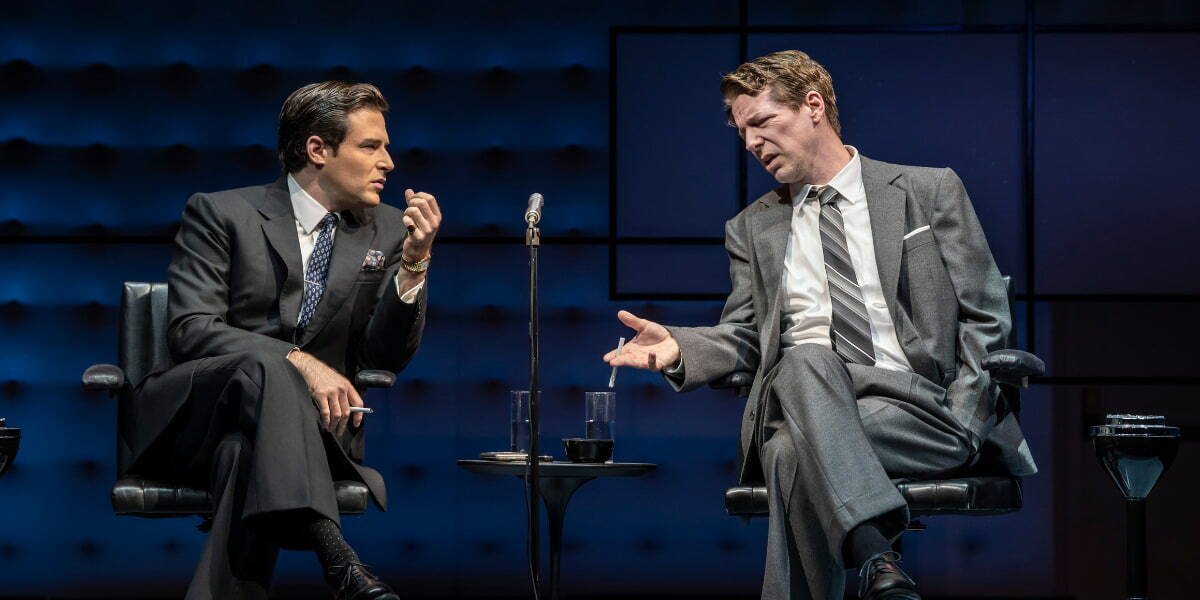Good Night, Oscar at the Barbican Review: Sean Hayes Stuns in a Haunting Portrait of Genius and Collapse
Posted on
| By
Hay Brunsdon
Most modern audiences won’t know the name Oscar Levant—once a household figure famed for his dazzling piano playing, acid wit, and Hollywood presence. But in Good Night, Oscar, playwright Doug Wright brings him sharply into focus, setting the action during a 1958 episode of The Tonight Show with Jack Paar. The setting may feel familiar — the pressure of live TV, the scramble for ratings — but at its centre is a man coming apart.
Levant was a celebrated interpreter of Gershwin’s music, a comic firecracker known for his scandalous one-liners, and one of the first public figures to speak openly about mental illness. Yet his brilliance came at a heavy cost. Living under the long shadow of Gershwin, battling addiction, and grappling with anxiety, OCD, and likely schizophrenia—conditions rarely discussed in his time—Levant’s genius was intertwined with profound suffering.

Wright’s script condenses real events into a fictional frame: Oscar is granted a four-hour leave from a psychiatric facility under the pretence of attending a family graduation but instead is smuggled into a TV studio to perform. What follows is both farcical and deeply unsettling—a man barely held together by wit, medication, and sheer force of will, trotted out for one more ratings boost.
Sean Hayes ricochets between hilarity and heartbreak.
Best known to millions as the flamboyant Jack McFarland in Will & Grace, Sean Hayes faced the kind of uphill battle that haunts actors tethered to iconic TV roles. It’s no small thing to de-robe a character that made you a household name — to convince an audience they’re seeing someone entirely new. But Hayes doesn’t just shed Jack; he obliterates him. And he doesn’t play Oscar Levant—he becomes him.
Every detail is meticulous: the hunched posture, the compulsive hand movements, the withering stare, the jittery voice and the almost out-of-sync intonation barely tethered to reality. All of which create a haunting portrait of a man wrestling with brilliance and breakdown. This is total immersion. It’s a performance that ricochets between hilarity and heartbreak. One moment you’re laughing out loud at zingers like, "I was once thrown out of a mental hospital for depressing the other patients," and the next, you catch your breath as he is dragged kicking and screaming into his own hallucinations—this man is clearly unravelling, and we are complicit in watching. This mix of rough edges and dazzling vulnerability makes Hayes’ performance impossible to look away from.
Ben Rappaport shines as Jack Paar, capturing the charm and ambition of a man balancing concern for his friend Oscar paired with his own self-interest and the relentless demands of live television. Meanwhile, Rosalie Craig delivers a powerful, layered performance as June—resilient and fiercely protective, yet visibly burdened by the toll of caring for her husband.
The play’s brilliance lies in how it sets up the comedy, then pulls the rug out from under us. Why are we laughing? And at what cost? Oscar is shoved under the studio lights for ratings, his genius exploited, downing entire bottles of pills to keep going. He hallucinates George Gershwin — whose shadow he could never escape — and we see how even his recovery was paused to satisfy a public craving for performance.
For any artist who's ever given too much of themselves, this hits hard. Mental illness doesn't always look like tragedy; sometimes it looks like brilliance on stage. And that’s what makes this a story not just of its time, but of ours. In reclaiming Oscar Levant’s spotlight, Good Night, Oscar reminds us: suffering shouldn’t be the price of performance.
Playing at the Barbican Theatre until Sat 21 September, book your Good Night, Oscar tickets now.